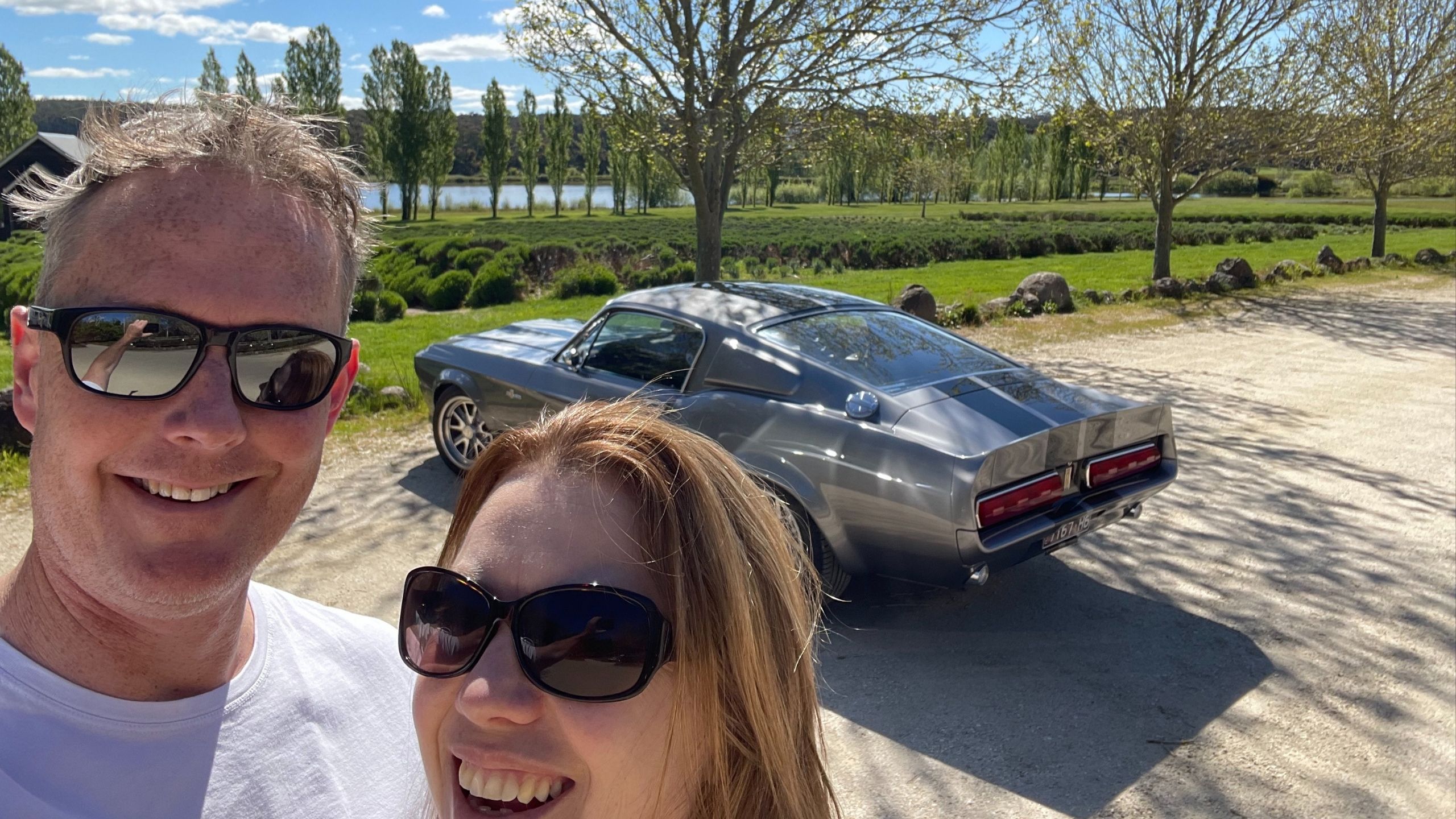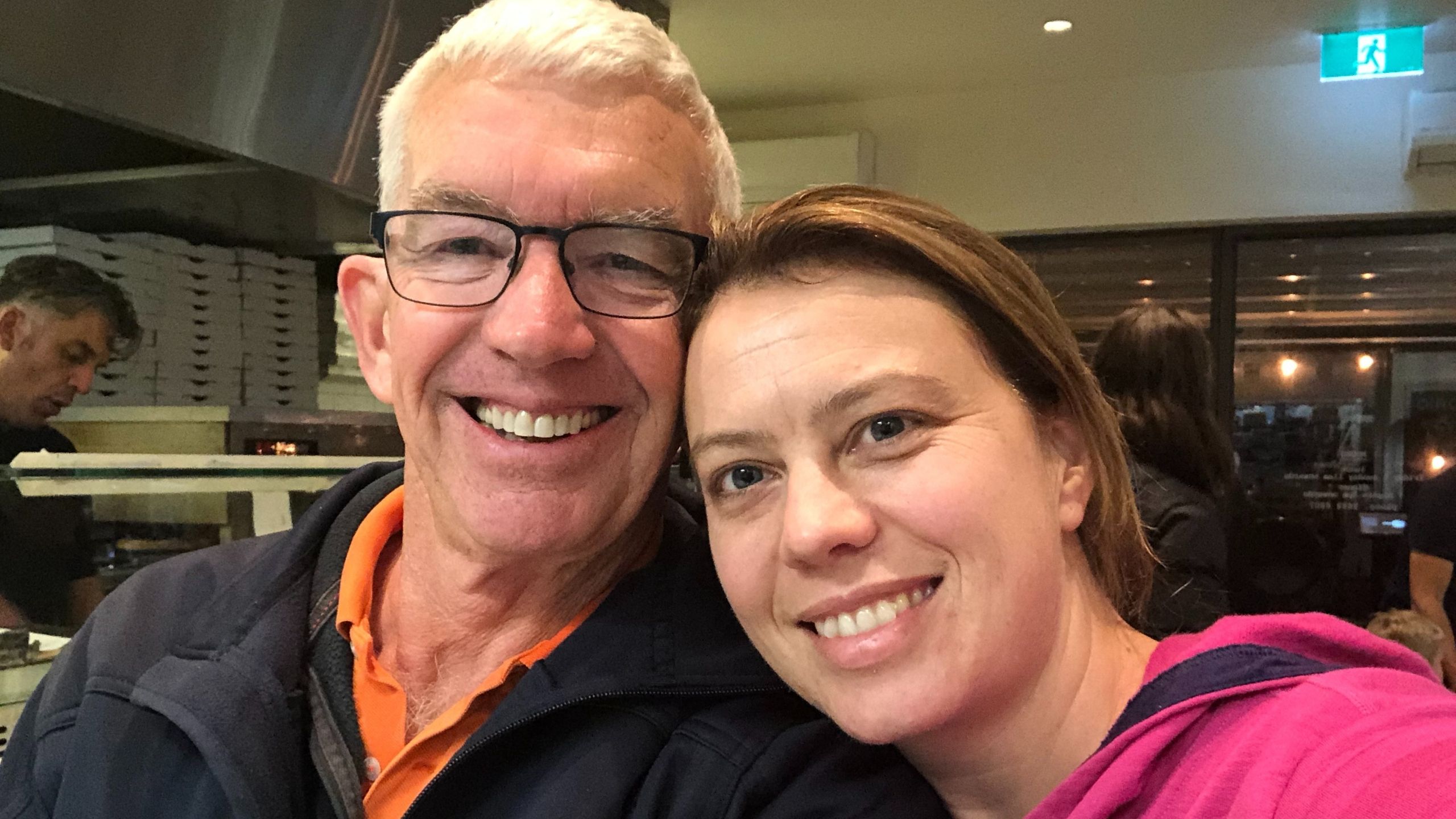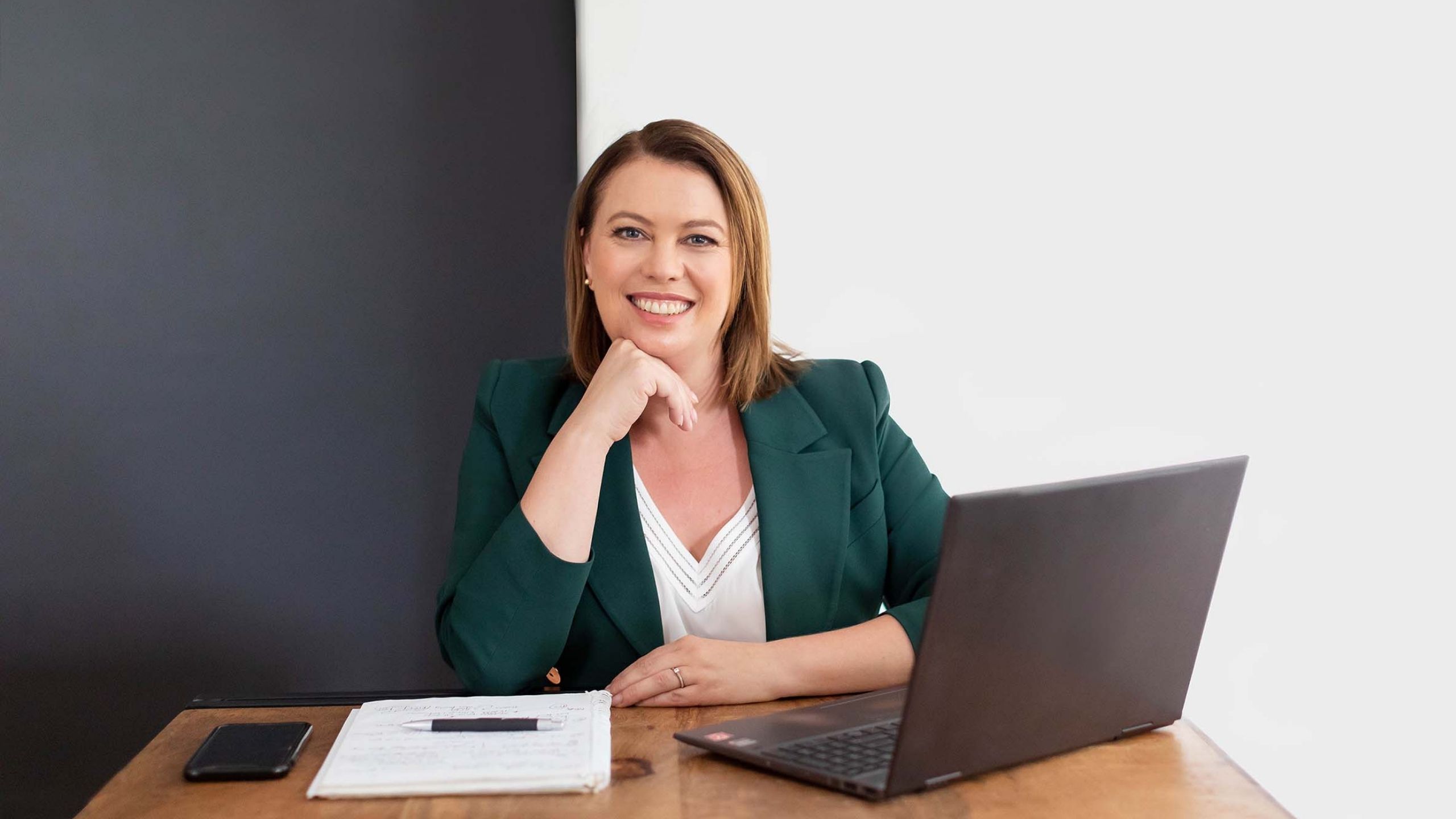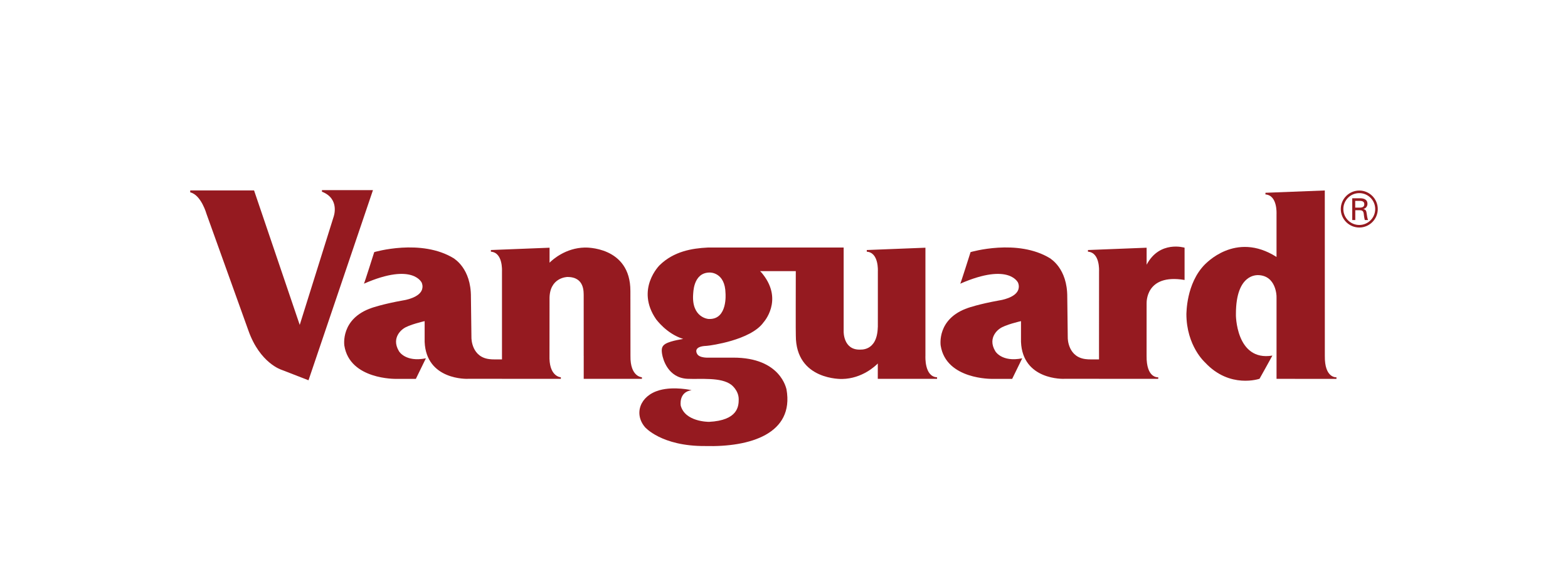Meet Nicola: The adviser with a killer car (and a kind heart)
Nicola isn't exactly a hard nut to crack. She's wonderfully warm and genuine, openly sharing her story with this writer as if we had been friends for decades (and maybe, now, we will be).
Having witnessed the struggles her father suffered after a diagnosis with Multiple Sclerosis in his mid-50s, Nicola decided she needed a career change. Abandoning a nearly decade-long career in law, she pursued a calling in financial advice, where she would be able to help other people, like her father, find financial freedom in truly difficult times.
She's made mistakes along the way (haven't we all), but has taken them in her stride. And after a few early setbacks, Nicola has established herself as a trusted name to hundreds of clients - young, old and those living with illness and disabilities.
She's now the chair of the Pro Bono Financial Advice Network, an organisation that matches those living with MS with a trusted financial adviser. While there are currently 25,600 Australians living with MS, Nicola hopes to expand the network further, so advisers can help those impacted by any illness or disease.
In this Meet the Adviser profile, you learn more about Nicola and her work in financial advice, including her biggest investment, a 1967 Shelby GT500 Eleanor Ford Mustang - which her husband miraculously won in a $100 raffle.
Financial adviser profile
- Name: Nicola Beswick
- Age: Good question! ;)
- Current firm: FMD Financial
- Years working as an adviser: I've worked in the industry since 2014, having pursued a career in financial planning after nearly a decade working in law. I started out as a paraplanner and have progressed to an adviser. I do not regret changing my career direction – I absolutely love what I do and the people I get to help along the way.
- Investment goals: To ensure that I can enjoy both my present and future. My partner, Mark, and I want to make sure we can do the things we want in the short term and also have a plan for our future. It’s something I tell my clients to do (within reason), as you never know what life will throw your way.
- Products used: A combination of real assets (a 1967 Shelby GT500 Eleanor Ford Mustang) and direct residential property (I am a New Zealander with a love for the property market!). Other investments we hold directly via Bell Direct share trading accounts and we also invest directly in managed funds. We also hold risk insurance with TAL.
- Biggest portfolio holding: Currently a 1967 Shelby GT500 Eleanor Ford Mustang. This ‘investment’ was added to our portfolio around six months ago when Mark entered a charity raffle. We don’t typically purchase lotto tickets or enter raffles so this win was a massive surprise. I didn’t even know he had entered the raffle until he came home with a stunned look on his face.
.jpg)
Why did you choose this profession and how did you get started as a financial adviser?
My Dad was diagnosed with Multiple Sclerosis in his mid-50s, which resulted in him losing the use of his right hand and side of his body. As a result of his MS, he was able to successfully claim on an IP policy which covered his income for the next 10+ years.
While Dad was going through this process, I was forced to think about my own personal situation. I began to learn more about money and investing and decided to look after myself financially for the future. Like many other Australians, I didn’t know that much about money, investing, and to be honest, wasn't even that interested in it until I saw what my Dad was going through.
.jpg)
Since then, my investment strategy and portfolio have been built using trial and error, as well as some great wins (and of course, losses!). It’s made me a better investor for myself and for my clients.
As I started reading everything I could about money this little spark formed inside me. My research helped me to realise how little many know about finance and how looking after this part of ourselves can have a massive, positive impact on our futures. I knew I wanted to help people take charge of their financial future.
At the time, I was working in intellectual property law and, looking back, I knew I was not 100% fulfilled by this job (nor do I have the right personality for corporate law). So I began to set myself up for a career change and studied for an Advanced Diploma in Financial Planning.
Thankfully, my partner, Mark, was completely supportive of me during this time. It took me around 400 CVs (I know because I counted all the cover letters one day on my computer), countless interviews and rejection letters before I was hired in a part-time role as a paraplanner for a practice in Armadale, VIC.
Since then, I’ve continued studying and learning about financial advice and have become a strong advocate for the benefits of financial advice for the general public.
What do you believe makes you different to other advisers in the industry?
I see my role as someone who is there to understand a client and get to know them as a person and then work out how to make their financial situation work for them.
Financial planning is not just about understanding the numbers, but really getting to know a client, understanding who they are as a person and what’s important to them – after all, we are all very different.
I try not to walk into a new client meeting with any preconceived ideas and listen to what someone is saying (or not) about where they are and where they want to go in their lives. Many of my clients are retirees or pre-retirees and are entering that phase of their lives. Others are younger people with a focus on risk insurance and basic cashflow strategies.
However, my real passion is helping those that may have undergone a life-changing event, such as divorce, illness or trauma. I have a number of clients who are single females and know they need to build wealth for their future and I also work with clients who have received Total and Permanent Disability (TPD) Insurance payouts and TAC (Transport Accident Commission) payouts.
People struggle with both visible and invisible impairments after traumatic incidents, so once they receive these types of payouts it's incredibly important that they correctly set themselves up for the future.
For example, one of my clients is a very strong young woman (in her early 20s) who had received a TAC payment after a life-changing car accident. The accident left her with so many invisible symptoms that she is unlikely to work full time for the rest of her life. She needed her money to work for her and supplement the income she was going to receive.
Another lady in her 40s has come to me after her lawyer successfully claimed on three different TPD payouts. She couldn’t work and with her illness, her lifespan wasn’t going to be compromised, so we had to ensure that her money would last. With the TPD payouts, we managed to increase the internal tax-free percentage and structure her funds into a regular income stream. This ensured she could have a regular income and also minimize the amount of personal income tax she would have to pay.
.jpg)
Can you share a bit about your process for building portfolios and selecting investment products?
The most important perspective when building portfolios is to have a buy and hold philosophy, which will ensure we don’t need to sell investments too frequently in client portfolios.
The philosophy behind building an investment portfolio is to look for quality managed funds across the major asset classes in line with a client's risk profile. Sometimes, clients may come to me with existing investments that they wish to retain or have a large capital gain position (which means selling these positions would be detrimental to the client). These positions need to be factored into a client's end investment portfolio.
We use a combination of a core group of sector specialist managed funds and use index funds where appropriate to reduce costs (compared to using all active funds) and increase the predictability of returns. In some sectors, a range of fund managers with different investment styles have been selected to add further diversification to a portfolio.
If clients have a preference to hold direct investments, this is taken into account and investments that ‘fill the gaps’ in specific sectors are selected.
Can you share two of your “go-to” funds with us?
As noted above, we use high-quality investment managers across various sectors. Two of the staples within client portfolios are the Hyperion Australian Growth Companies Fund (for an Australian company focus) and Vanguard’s MSCI Index International Shares ETF (for an international focus).


I like Hyperion as it gives diversity to portfolios, especially those that have a stable exposure to high-quality blue-chip companies already. This Fund aims to invest in high-quality companies that display a clear competitive advantage. To achieve this, the team identify companies with predictable earnings and compelling growth trajectories over a relatively long investment horizon. Fundamental analysis is central to the research effort with a particular focus on company-specific financial analysis and qualitative industry factors. The Fund will invest across a range of small, medium and large capitalisation businesses, based on their research insights. The Fund has a stable team of analysts and portfolio managers executing on a consistent portfolio construction and risk management process.
In comparison, Vanguard is used in portfolios to get exposure to companies that make up the MSCI World (ex-Australia) Index. This ETF attempts to replicate this index by investing substantially all of its assets in the securities that make up the Index. Trading strategies are then utilized to minimize costs within the portfolio. This ETF gives portfolios a low cost, broad exposure to an important asset class for all portfolios.
How do you discover new managers and investment opportunities in a market saturated with products and issuers? What makes a manager stand out?
The internal investment committee are charged with this responsibility. The committee comprises of staff who also receive independent advice from three different investment specialists. They meet at minimum once a month, but more recently this has been fortnightly.
A pitch deck from a fund manager arrives in your inbox, what happens next?
The first thing that happens with any new fund that crosses our desks is to see what the research houses say. We use research from either Lonsec or Zenith Investment Partners and our licence states that any investment we want to use for client portfolios meets the appropriate ratings through these research houses.
The funds that don’t have these ratings don’t make it to the next stage of being reviewed internally by the investment committee or meeting the required approval to retain in an existing portfolio (unless a client wants to retain a position ).
How would you describe your personal investment strategy?
I am a typical New Zealander in that I am obsessed with residential property. So we initially began investing by buying and renovating properties. Mark and I make a great team - my financial side and Mark being an electrician, we complement each other with any project.
Our strategy has changed over time. Like my clients, I focus on different types of "buckets" for our investments and their purpose. I make sure we have cash funds available for those emergencies we don’t see coming, and also build up funds for our travelling (I love seeing different cultures and try to get a trip in each year).
We also invest surplus cash between portfolios outside of superannuation and inside superannuation. We’re more active with our non-superannuation investments compared to our superannuation wealth bucket. My philosophy has been to buy and hold assets, with a focus on investments that are more for growth than income.
I also like companies that are not at the smaller end of the share market – I use specialized fund managers to invest in this space on my behalf as I’d rather pay a professional to make more calculated decisions in this investment area than rely on my own research. Like I say to clients, sometimes it’s worth paying a professional to assist as we all have areas of expertise.
I am typical in that I think about everyone else and not myself sometimes. I appreciate that with this approach I have got caught out a little bit (as noted in the next questions).
I take a passive investment approach to our superannuation and outsource investment decisions with this money via managed funds. I feel that I would become a bit too concentrated in my investment decision thinking and appreciate another professional making specific decisions on our behalf. We’re very aggressive with this bucket, due to the long-term nature of this money. I do like the structure from a wealth accumulation approach and that balance of forgoing money in the short-term for the long term is the key - and one I know clients struggle with.
I also make sure that Mark and I make decisions together – he knows what we’re invested in and if I want to make a purchase, we talk about it and make a decision together. Having his perspective and input is an important step for me, as any discussion should be in a relationship.
What are the top three holdings, in percentage terms, in your personal portfolio and can you tell me a bit about why you hold each of these positions?
Australian Unity Health Care Property Trust (5%)
This came from the love of direct property and hearing from the portfolio manager as part of my work. There is no interesting story that goes with this investment, other than medical centres and hospitals that are essential to everyday life.
Cochlear (5%)
Cochlear is a world-leading company that focuses on developing hearing implants for those of all ages. This investment purchase was one of my earlier success stories and is a position that I have added to at various times. I had always been aware of the company as when I was in law, I specialized in intellectual property law (with a focus in biotechnology) and Cochlear are well known for their various patents around some of the litigation that goes with this. I initially saw an opportunity to purchase a holding when the share price dipped during a patent infringement trial in the USA and given my background in IP law I saw the opportunity to purchase a position, which has grown ever since.
A 1967 Shelby GT500 Eleanor Mustang (50%)
As I mentioned earlier, this asset was added to our current portfolio after Mark bought a charity raffle ticket. Apart from storage, this "investment" cost us $100. It’s a beautiful car, and despite not being a "car person", I have to say there is something about it.
We recently attended a fundraising event for the Good Friday Appeal with a number of car enthusiasts who have told us how rare the car is, and will continue to be sort after given the shape of them, so it was well worth the $100 investment!
.jpg)
Could you tell me about your worst investment? How did you deal with this falling position or fund?
This is such an embarrassing story (and is the reason why I now use specialist investment funds to make investment decisions in this area). It was one of my very, very, very early non-property investment purchases - when we started investing in the ASX - and thought we’d take a punt on a debt collection company called Collection House (ASX: CLH).
It is the typical story of hearing about this company from an article, looking into it, and then making a decision to purchase some shares. I think it was around six months later the share price fell significantly (I can’t remember the reason for it).
We still hold the position. My theory is there is possible upside to the investment, and it will always be crystalized for a loss in the future if needed.
The silver lining with this was we lost around $1,600 in total as we didn’t have the guts to back ourselves with more money at the time. I also learnt more about looking into companies and taking investment articles with a grain of salt.
What conversations are you most frequently having right now with clients? And what is your answer to these questions?
Recently many clients have been asking questions that are centred around others within their family unit – I think that is due to the generation of my clients and other factors that are going on in their worlds. These questions are either one of two:
1. How can my children get into the property market and what can I do (or I want to give them $X) to assist?
This is such a common question that I am finding parents are asking. My answer to this question really does depend on the client and their needs. Most of the time, I end up offering to chat to the client’s children directly to find out more about their own situation and time horizon for purchasing a home. The majority of the time, the conversations are focused on either:
(a) Structuring cash flow properly and putting realistic goals in place to work around saving for a deposit.
(b) Understanding which types of properties increase in value (and which don't) and how this can assist them with ‘trading up’ in the future to purchase a ‘better’ property in their eyes.
(c) Pointing them in the direction of mortgage brokers to get a better understanding of their own borrowing capacity (assuming they have a deposit).
2. How can I manage my parents going into aged care?
This conversation or question comes in various forms and is something that I’ve been asked frequently in more recent times. Generally, the questions are structured around the cost of Mum or Dad going into care, and the process that comes with it.
There isn’t one answer to this question, as costs depend on a person’s specific financial position, so I start with an overview of the different fees associated with someone going into care and how these fees are structured. It’s such an emotional time for people and being able to understand this complicated area is important for everyone – especially when people feel like they must make decisions (generally around the family home) that may not end up being the correct ones.
3. How can I earn more money from the savings (or cash) in my bank account?
Not surprisingly, this question comes up a lot. My answer does depend on everyone’s position and the amount of money they have saved. If someone needs the money as a safety net, the money should go into a term deposit or high-interest savings account, but if someone doesn’t need the money in the short term, then we will have a conversation around investing it for the longer term and adding to their existing portfolio.
What are the most common mistakes you see in the portfolios that you inherit and how do you go about fixing them?
The most common mistake I see with the portfolios I inherit is a misalignment of a client’s portfolio with their risk tolerance – especially when it comes to a client’s exposure to growth assets (and the type of growth assets).
Fixing them depends on the situation and the experience a client has had previously with those assets. For some clients, it can be a simple, straightforward conversation. I go back to basics and make sure to spend time with a client on their tolerance for investment risk, their portfolio and the pros and cons of where they are versus where they ‘should be’. I believe that having this discussion around the basics can help instil the fundamentals we learn as professionals for clients and can also help clients become more involved in the financial planning process.
For others, it can be a lot more time-consuming. Sometimes clients have had an extremely bad experience with financial advice, and it can take a lot of time for them to learn to trust what we’re doing for them. These clients, where a portfolio may not have performed as well as it could have, generally make people more nervous around changes. So understanding the behaviour behind decisions or any apprehension about making decisions, becomes extremely important.
If you could change one thing about the industry so that it can better serve Australians, what would that be?
To make advice more affordable for everyone by making the advice process simpler to provide. My motto is that “you can always do something for someone”, and small changes can positively impact the future of many people.
Currently, the cost to provide advice to everyday Australians - those who are not ‘high net worth’ individuals - puts seeking advice from a professional out of reach. Generally, someone is looking at a starting rate of $3,000 for the initial plan and then the cost for ongoing advice varies.
Sometimes people don’t see the value of that outlay and they get scared of spending the money that would ultimately help them – which is where our role as financial advisers comes into play. We need to educate people on the value of getting advice from a trusted professional.
The new education standards will help change the perception of the industry for the better (even though I am a perpetual student these days as I am studying for my Masters in Financial Planning). However, there are a lot of older advisers existing now who are new to these requirements. This will certainly put pressure on financial planning companies (and their balance sheet) which will in turn impact clients.
I am confident that we will see a more improved breed of advisers come through in the years to come, but this will take time. Hopefully, more females see financial planning as a career choice too as we bring a different skill set to the table.
Can you share a personal passion or ambition you have for your future?
I love scuba diving and travelling the world (especially when it comes to finding great diving spots)! I completed my PADI Open Water course when I was at University in Dunedin (NZ) and still have memories of learning to dive with snow around the hills. It’s my number one go-to hobby when I head away on holiday, as I find it so relaxing - like being in another world.
I convinced Mark to complete his PADI Open Water course early on in our relationship and now our travel plans are generally built around great diving sites or various experiences. It never stops at one dive though – or most recent trip away was to Fiji and our plans went from one day’s diving to five. During this trip we went ‘Shark Diving’ with schools of Bull Sharks (no cage), and it was a combination of the best and most terrifying dive that I’ve done.
.jpg)
My other passion is the work we do with the Pro Bono Financial Advice Network (PFAN). I was appointed as the chair of PFAN in mid-2021 and while it does take up a bit of my time, it is worth every moment of it. It is truly inspiring to hear all of the stories of people that have benefited from this service.
PFAN helps match clients who are experiencing financial hardship due to illness or disability and match them with a trusted financial adviser on our register. Currently, we work with those impacted by multiple sclerosis, but my goal is to create a strong network of advisers who want to provide support to those impacted by any illness or disease. The only other organization that I know of that exists that does something similar is the Cancer Council.
Recently, we assisted a lady in her early 40s with MS who was looking at selling her house as she couldn’t afford the mortgage repayments with the money she was receiving from Centrelink. She can't work, so this income and her savings were what she had been living on. What she didn’t know, and I quickly realized, was that she has a TPD insurance policy within her superannuation fund which was more than enough to cover her mortgage and still give her some funds left over.
The team behind PFAN are working incredibly hard to do this, and I’m proud of what we’ve achieved so far. If I didn’t need to make money – then I would be working on PFAN full time.
If you want to learn more about PFAN, you can check out the website here.
Are you enjoying Livewire's new Meet the Adviser series?
If you enjoyed hearing about Nicola's investing journey, please give this wire a 'like', and if you know someone who might enjoy the article, why not send them the link.
You can access more of our Meet the Adviser and Meet the Investor interviews by clicking here.
We are looking forward to hearing from more financial advisers in 2022. If you are interested in being profiled in our Meet the Adviser series, contact us using the email address below:
content@livewiremarkets.com
3 topics
1 stock mentioned
2 funds mentioned

